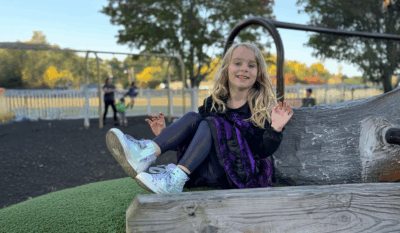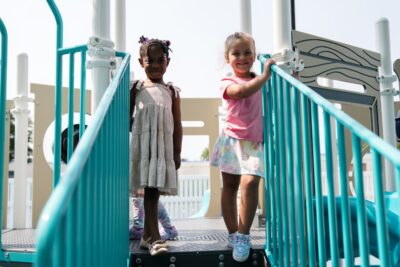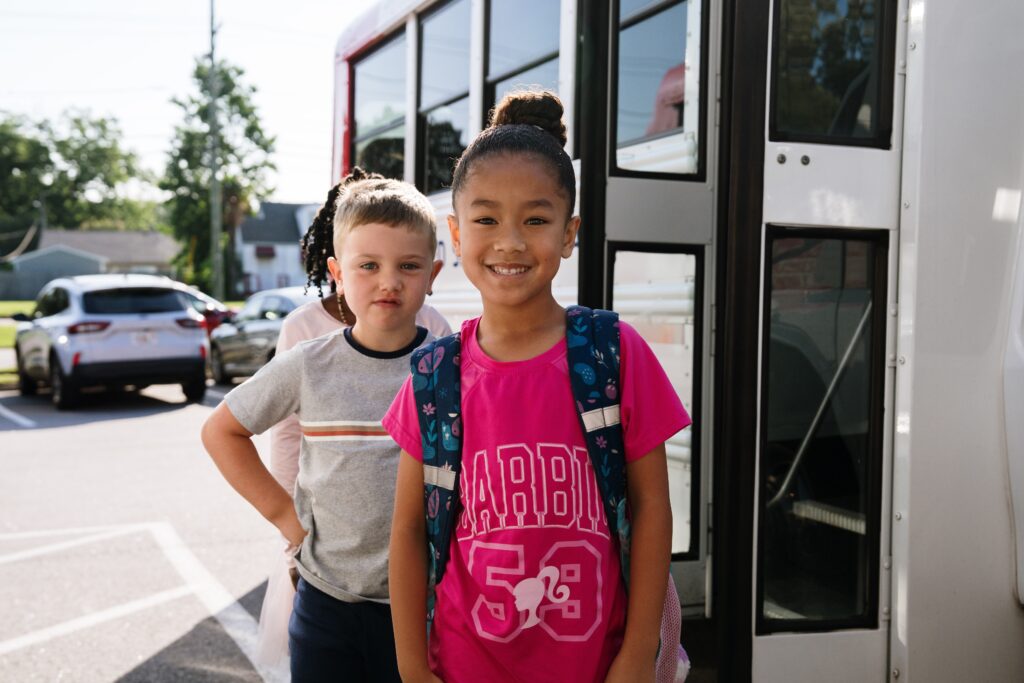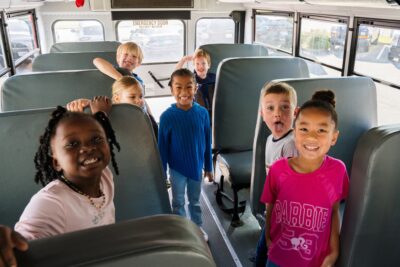New School Year, New Beginnings: Support for Military Kids
Written by Julianna Burson
 Back-to-school season is an exciting time — fresh backpacks, new teachers, and new friends. But for military kids, it can also mean starting over completely. Every Permanent Change of Station (PCS) move brings uncertainty: new schools, new faces, new routines. While these changes build resilience, they can also bring stress and big feelings for kids and parents alike.
Back-to-school season is an exciting time — fresh backpacks, new teachers, and new friends. But for military kids, it can also mean starting over completely. Every Permanent Change of Station (PCS) move brings uncertainty: new schools, new faces, new routines. While these changes build resilience, they can also bring stress and big feelings for kids and parents alike.
As a military family about to PCS again, I know firsthand how challenging it can be to help our kids adjust — and how vital strong military family support is to help them thrive.
Starting Over, Again
Our family is preparing for another cross-country PCS move from the East Coast to the West Coast. This will be our daughter’s third PCS move — but her first as a school-age child. She just finished preschool at our local elementary school and has finally built strong friendships. The expected report date is estimated for late winter or early spring of her kindergarten year. The emotions are already overwhelming, and we don’t even have orders yet:
We’re excited about the California lifestyle and reuniting with friends, but also nervous about the cost of living and employment challenges. Additionally, we’re anxious about where our child will attend school and what our military family support will look like.
This tour is for sea duty, which means a lot of family separation. Our current duty station keeps us within driving distance of extended family. If we stay behind, our daughter will have the consistency of staying in her school with the same classmates for the next four years. We’ve already shed tears over leaving our house and our chickens — there’s no room for tiny dinosaurs where we’re going! We’ve looked at maps of the US, comparing our current duty station to the next in San Diego — more tears.
If we accompany my spouse, we’ll likely wait until our daughter finishes kindergarten. Thankfully, she’s very social and loves making new friends. From my own experience as a military kid and as an educator working with military children, I know that starting a new school is easier at the beginning of a new school year than in the middle.
No matter when a PCS move happens, the constant change, leaving friends, and adjusting to new environments can be tough. Thankfully, military kids are resilient!
Helping Kids Adjust to a New School
Supporting military kids through school transitions can be challenging, but so important. As an educator of both military and civilian children, I’ve seen how hard moving can be — whether it’s a PCS move or civilian relocation. Everyone gets a fresh start at the beginning of the year to make new friends. However, moving mid-year is tougher: social circles are already formed, extracurricular activities might be full, and different states have varying curricula.
Educators don’t always know which students are military kids unless the child, parent, counselor, or military school liaison shares this information. Military school liaisons are incredible resources, helping bridge gaps and providing educational and military family support. I’ll never forget one middle school student whose mom told me about their PCS move at a back-to-school event — and flagged some signs to watch for: mood swings, headaches, clinginess, and outbursts over small things.
Another military kiddo who PCSed in the middle of the year seemed happy and social — until one day, she burst into tears, saying, “I just miss my mom!” Her mom had deployed shortly after their PCS move. I became the ‘school mom’ for both girls, having lunch together when they needed a safe space to talk.
Signs of Stress: Adjusting to a New School
It’s not always easy for military kids to express what they’re feeling. According to Milestones Psychology, and the American Psychological Association (APA), look out for these signs of stress during back-to-school transitions:
- Physical signs: Fatigue, sleep disturbances, headaches, stomachaches, excessive sweating, shaking/restlessness
- Emotional signs: Dread, apprehension, irritability, mood swings
- Behavioral signs: Procrastination, appetite changes, avoiding school activities, clinginess, or seeking negative attention
The Role of ASYMCA and Operation Hero
The Armed Services YMCA (ASYMCA) is deeply committed to military family support. Military kids move an average of 6–9 times before graduating high school — and each PCS move can make it harder to feel settled at home or school.
Operation Hero
Operation Hero is a 10-week after-school program specifically for military kids in grades 2–5. It helps build resilience and confidence in handling challenges like PCS moves and deployments.
- Emotional Adjustment: Self-esteem, bullying prevention, and separation topics help kids navigate big feelings.
- Peer Connection: Kids meet other military kids who understand their situation — friendships and outdoor fun make a big difference.
- Academics: Operation Hero provides homework help alongside the course’s lessons.
Find your local ASYMCA branch to learn more about Operation Hero in your area!

ASYMCA Programs That Support Military Families
ASYMCA programs help military kids thrive at all ages — from early childhood through the school years:
- Operation Little Learners: Parent-child education for ages 18 months–5 years (We LOVED this in San Diego — highly recommend!).
- Child Care & Preschool: Affordable programs that nurture literacy, creativity, and social skills.
- Before & After School Care: Enrichment and care that support military spouse employment and military family support.
- Hampton Roads ASYMCA: Ages 5–12
- Fort Bragg ASYMCA: Kindergarten–5th grade
- Killeen ASYMCA: 41 elementary schools
- San Diego ASYMCA: After School Achievement Academy for grades K–5
- Events:
- Back-to-School Bash: The San Diego ASYMCA provides school supplies to military kids, K-8th grade.
- Back-to-School Snack Bash: The Fairbanks, Alaska ASYMCA and the JBER Alaska ASYMCA invite military kids in grades K-12 to fill a bag with their favorite snacks.
- Winter Gear Up: The Alaska ASYMCA prepares school-age military children for Alaska winters by providing coats, boots, snow pants, hats, scarves, and gloves at no cost.
While programs like Operation Hero help military kids build resilience and confidence during a PCS move or a new school year, there’s so much parents can do at home, too.
8 Tips for Parents Supporting Military Kids
Navigating a PCS move or a new school year can be overwhelming for both parents and military kids. The good news? A little extra support and a few thoughtful steps can make all the difference. Here are some practical ways to help your kids feel more secure, connected, and confident during times of change.
1. Consistency is Key
Maintaining familiar routines provides a sense of security for military kids during PCS moves and back-to-school changes. Simple things like family dinners, bedtime rituals, or weekend traditions help kids feel grounded even in a brand-new place.
2. Attend Back-to-School Events
Make it a priority to attend local back-to-school nights, Open Houses, and school fairs. These are great opportunities to meet teachers, learn about extracurriculars, and connect with your school’s military liaison for extra support.
3. Listen and Validate Big Emotions
Sometimes big feelings just need to be heard. It’s okay for military kids to feel sad, angry, nervous, or all of the above during transitions. Create space for open conversations and remind them that it’s normal to feel a mix of emotions.
4. Encourage New Friendships
 Help your kids plug into clubs, sports, dance, martial arts, or scouting — anything that matches their interests. Having a peer group makes new places feel less intimidating and builds their resilience.
Help your kids plug into clubs, sports, dance, martial arts, or scouting — anything that matches their interests. Having a peer group makes new places feel less intimidating and builds their resilience.
5. Connect with a Military School Liaison
School liaisons are an incredible resource for military families. They help bridge gaps when kids move schools, offering guidance on academics, transitions, deployments, and community resources.
6. Use Tutoring if Needed
A new school can mean new gaps in learning. If your child needs extra help, know that military families have access to free online tutoring and homework help 24/7 — don’t hesitate to use it!
7. Utilize ASYMCA Programs
ASYMCA offers programs and events to help military families settle in quickly. From Operation Hero to childcare and family events, these resources build connections, provide practical help, like food assistance, and ease the stress of moving.
8. Celebrate the Wins
A win is a win, no matter how small! From surviving the first week meltdown-free to making a new friend, joining a club, or getting good grades — each milestone is worth recognizing. Small celebrations build big confidence for military kids.
Every New Start is a Step Forward
Each new duty station offers a fresh start for parents and children — an opportunity to improve upon ourselves or reinvent ourselves altogether. Moving to a new duty station or school can be challenging, but it also presents an exciting opportunity to grow and learn. Our vast country is diverse, and each new duty station has brought a deeper understanding and appreciation for our military community.
Donate to Support ASYMCA Programs for Military Kids
Through programs like Operation Hero, the Armed Services YMCA helps military children build confidence, form connections, and thrive through transitions — whether it’s a PCS move, deployment, or a brand-new school year.
Your gift can make a real difference for military kids and families — donate today to help them feel supported every step of the way.


